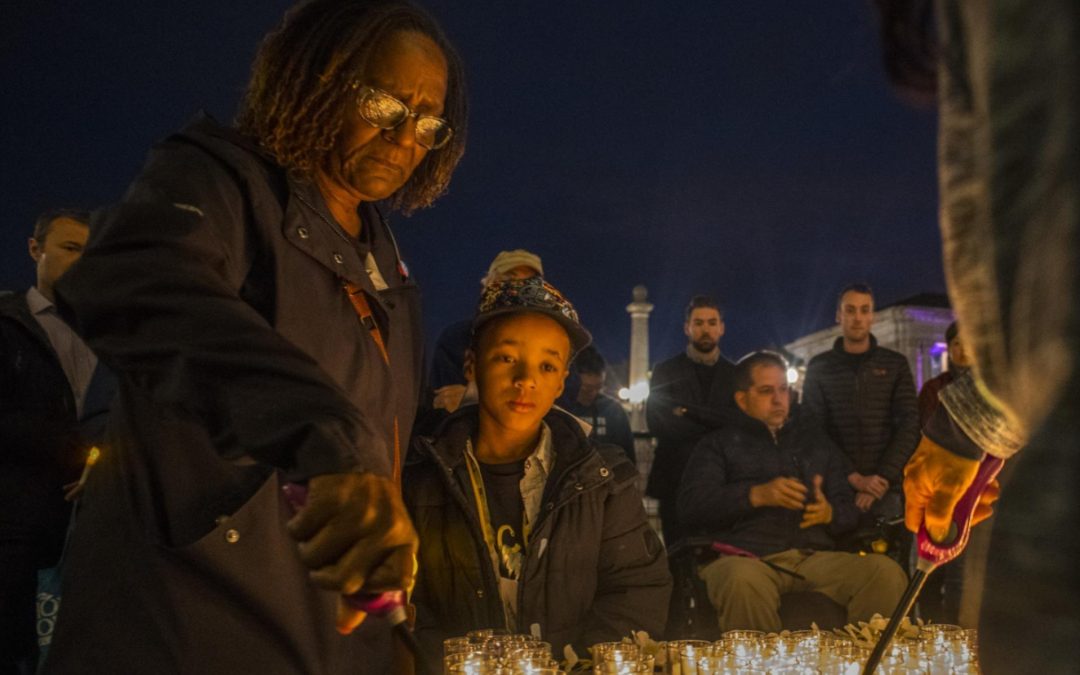This week, we issued our second annual report card and awarded an overall grade of C+ for the City and County of Denver’s progress in 2019 on its Vision Zero Action Plan aimed at eliminating traffic fatalities and serious injuries. The Report Card focuses specifically on Denver’s progress on street safety improvements, such as building sidewalks and bike lanes. Our current street system is dangerous by design, and the City will not achieve zero traffic fatalities or serious injuries without these fundamental improvements.
Denver performed slightly better in 2019 compared to 2018 at meeting some goals for street safety improvements as outlined in the Vision Zero Action Plan. Notably, the City made significant progress on two types of improvements: corridor-level traffic calming on 15th St, 17th St, 32nd Ave, and Park Ave, and street lighting enhancements throughout Denver. Denver also got 2020 off to a good start with additional corridor-level traffic calming completed right away in January, including the West 35th Avenue Neighborhood Bikeway, which included traffic circles and diverters, curb extensions, marked crosswalks, and median refuges. This corridor is an excellent example of people-friendly infrastructure and one we’d like to see more of in 2020.
Unfortunately, the City came up well short of their annual goal to build 14 miles of new sidewalks (only completing 4.4 miles), and also fell behind on their goal to build 20 miles of new bike lanes. While the City exceeded its numeric goal for pedestrian crossing and intersection improvements, the vast majority of these were not located on the High Injury Network, which is the 5% of the streets where 50% of the traffic fatalities occur and includes streets like Colfax Avenue, Federal Boulevard, and Colorado Boulevard. It’s disappointing to see basic people-friendly infrastructure like sidewalks, bike lanes, and intersection upgrades be continually deprioritized, particularly considering the low-cost and high-impact nature of these improvements.
To improve their overall score, the City should accelerate implementation of the street safety improvements committed to in the Vision Zero Action Plan. Furthermore, we call on city leaders to enact the following policy changes to immediately make our streets safer:
- Lower speed limits citywide
- Ban turns on red downtown and on the High Injury Network
- Increase fines for parking in or blocking bike lanes
- Eliminate pedestrian “beg buttons” on the High Injury Network
- Aggressively pursue a state legislative strategy expanding the use of photo speed radar and red light cameras
- Fully fund planned Vision Zero projects
See the full report card and policy recommendations on the DSP website.
Streets are for people!
At the Denver Streets Partnership, we firmly believe that public space is just that: public. All too often, the areas we share as a community get monopolized by cars, leaving people walking, biking, and rolling vulnerable and, during COVID-19, without adequate space to be outside safely.
Those are just a few of the reasons we are thrilled that Denver is allowing restaurants to expand seating onto sidewalks, streets, and parking areas. This is a perfect example of reclaiming streets for people while supporting local businesses during these difficult times and we are excited to see it move forward.
Restaurants can submit proposals for outdoor expansions on the City’s website.
Ride and Walk of Silence
Join our Denver community in this year’s Ride and Walk of Silence, an event that memorializes community members who have lost their lives from traffic crashes and raises much-needed awareness.
This year’s commemoration will be a virtual Facebook event that you can attend at your own convenience.
Participate by taking a solo ride or a walk in silence sharing pictures and memories of loved ones lost to traffic violence one the Facebook event and using the hashtag #rideofsilence2020.
Light a candle and join the online vigil tonight at 5:00 p.m for a moment of silence to honor those who have been killed.

